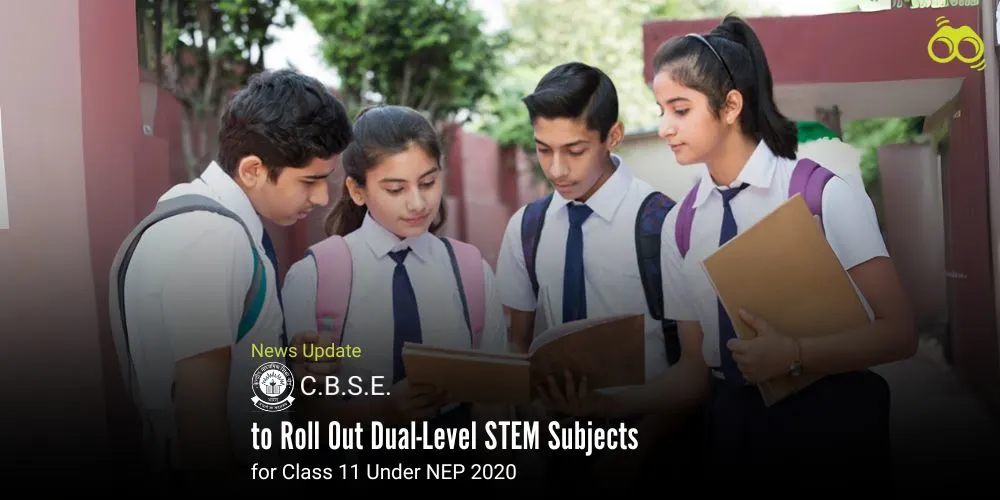CBSE’s New STEM Framework to Offer Flexibility and Reduce Academic Pressure in Senior Classes
Class 11 Students to Choose Subject Complexity as CBSE Aligns with National Curriculum Framework
In line with the National Education Policy (NEP) 2020 and the National Curriculum Framework for School Education (NCFSE) 2023, the Central Board of Secondary Education (CBSE) is preparing to introduce a two-tier system for STEM subjects, Science, Technology, Engineering, and Mathematics at the higher secondary level. This rollout is expected to begin with Class 11 in the 2026–27 academic session. At present, CBSE offers Mathematics in two formats, standard and basic, in Class 10. Both follow the same syllabus, but the basic level is considered less challenging. In December 2023, the Board’s governing body reportedly approved a proposal to extend this dual-level model to Science and Social Science as well, beginning with Class 9 from the 2026–27 session.
Following this, CBSE is now said to be planning to adopt the same structure at the senior secondary level, starting with STEM subjects in Class 11. However, officials noted that the timeline remains flexible, as it depends on the release of new NCERT textbooks for senior classes and how well they accommodate differentiated learning pathways. So far, the National Council of Educational Research and Training (NCERT) has released updated textbooks aligned with NEP 2020 and NCFSE 2023 for Classes 1 to 4 and Classes 6 and 7. Textbooks for Classes 5 and 8 are expected to be introduced in the current academic year, while those for Classes 9 to 12 are scheduled for subsequent sessions. According to NCERT notifications, textbooks for Classes 9 and 11 are likely to be ready by the end of this year. CBSE’s prior experience with offering Mathematics at two levels in Class 10 appears to have informed its decision.
During the 2023–24 board exams, approximately 30% of students opted for the basic version, with 15,88,041 registering for the standard paper and 6,79,560 choosing the basic level. This uptake suggests that a significant number of students prefer a less intensive curriculum when they do not intend to pursue the subject in higher education. According to sources, the dual-level model in Class 11 would allow students more flexibility by enabling them to take certain subjects at an advanced level and others at a basic level, depending on their academic interests and plans. This personalised approach is expected to better align with individual learning goals.
In 2023, CBSE reportedly ran a pilot programme in selected private schools, introducing advanced-level Mathematics, Science, and Social Science for Class 9 students. Feedback from these assessments reportedly indicated high interest among students in more rigorous content, further strengthening the case for a dual-level structure. At present, CBSE is said to be exploring how to reflect the advanced level in students’ final board results. One proposal, reportedly discussed by the Board’s governing body, suggests including an annexure with additional questions for those who opt for the advanced format. If implemented effectively, the dual-level model could provide students with more choice and flexibility, aligning school education with diverse academic and career aspirations.
Editor’s Note:
The Central Board of Secondary Education’s (CBSE) plan to introduce a dual-level model for STEM subjects at the senior secondary level marks a thoughtful step towards making school education more flexible and student-friendly. By giving students the option to study subjects such as Mathematics and Science at either a basic or advanced level, CBSE is recognising that not all learners follow the same path or have the same academic needs. This approach can help reduce academic pressure and allow students to focus more clearly on their interests and career goals. This initiative aligns with the National Education Policy 2020's emphasis on personalised learning and an inclusive academic environment. By allowing students to choose their preferred difficulty level, the education system shifts away from a uniform approach.
Skoobuzz believes that such reforms, if supported by appropriate textbooks, trained teachers, and clear assessment frameworks, can bring lasting change to India’s school system. Empowering students to make informed choices is a key step towards nurturing lifelong learners prepared for diverse future pathways.














0 Comments (Please Login To Continue)